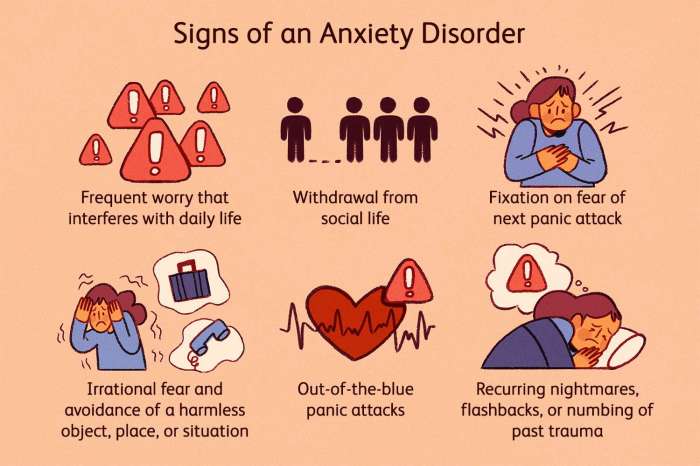Jonah experiences nearly constant anxiety, a debilitating condition that affects daily life and well-being. This comprehensive guide explores the nature of constant anxiety, its underlying causes, effective coping strategies, and the importance of seeking professional help.
Constant anxiety is characterized by persistent and excessive worry, fear, and unease. It can manifest in physical symptoms such as rapid heartbeat, shortness of breath, and muscle tension, as well as psychological symptoms like difficulty concentrating, irritability, and sleep disturbances.
Define Constant Anxiety

Constant anxiety, also known as chronic anxiety, is a persistent and excessive state of worry and fear that can last for weeks, months, or even years. It is characterized by an ongoing feeling of unease, apprehension, and nervousness, even in the absence of any real or imminent threat.
Common symptoms associated with constant anxiety include:
- Excessive worry and fear
- Difficulty concentrating
- Irritability and restlessness
- Muscle tension
- Fatigue
- Difficulty sleeping
- Racing thoughts
- Avoidance of social situations
- Physical symptoms such as headaches, stomach problems, and shortness of breath
Constant anxiety can have a significant impact on daily life and well-being. It can interfere with work, relationships, and social activities. It can also lead to physical health problems, such as insomnia, headaches, and digestive issues.
Causes of Constant Anxiety
The exact causes of constant anxiety are not fully understood, but several factors are believed to contribute to its development.
Biological factors
- Genetics: Some people may be more likely to develop anxiety disorders due to their genetic makeup.
- Brain chemistry: Imbalances in neurotransmitters, such as serotonin and norepinephrine, have been linked to anxiety disorders.
Psychological factors, Jonah experiences nearly constant anxiety
- Personality traits: People who are more prone to worry and perfectionism may be more likely to develop constant anxiety.
- Negative thinking patterns: Negative thoughts and beliefs about oneself, the world, and the future can contribute to anxiety.
- Past experiences: Traumatic or stressful experiences in the past can increase the risk of developing anxiety disorders.
Environmental factors
- Chronic stress: Ongoing stress from work, relationships, or other life events can trigger or worsen constant anxiety.
- Substance use: Alcohol and drug use can increase anxiety levels.
- Medical conditions: Some medical conditions, such as thyroid problems and heart disease, can cause or worsen anxiety symptoms.
Coping Mechanisms for Constant Anxiety

There are a number of effective strategies for managing and coping with constant anxiety.
Relaxation techniques
- Deep breathing: Deep breathing exercises can help to calm the nervous system and reduce anxiety levels.
- Mindfulness meditation: Mindfulness meditation involves paying attention to the present moment without judgment. It can help to reduce stress and anxiety.
- Progressive muscle relaxation: Progressive muscle relaxation involves tensing and relaxing different muscle groups in the body. It can help to reduce muscle tension and anxiety.
Cognitive-behavioral therapy (CBT)
CBT is a type of therapy that helps people to identify and change negative thinking patterns and behaviors that contribute to anxiety.
Exercise, sleep hygiene, and nutrition
- Exercise: Regular exercise can help to reduce stress and anxiety levels.
- Sleep hygiene: Getting enough sleep is essential for managing anxiety. Establishing a regular sleep schedule and creating a relaxing bedtime routine can help to improve sleep quality.
- Nutrition: Eating a healthy diet can help to improve overall health and well-being, which can have a positive impact on anxiety levels.
Seeking Professional Help

If constant anxiety is interfering with your daily life and well-being, it is important to seek professional help.
Therapy and medication can be effective in managing anxiety disorders. There are a number of different types of mental health professionals who specialize in anxiety treatment, including psychologists, psychiatrists, and social workers.
There are also a number of resources available to help people find therapists and support groups. The National Alliance on Mental Illness (NAMI) and the Anxiety and Depression Association of America (ADAA) are two organizations that provide information and support to people with anxiety disorders.
User Queries: Jonah Experiences Nearly Constant Anxiety
What are the common triggers for constant anxiety?
Potential triggers include stressful life events, chronic stress, genetics, personality traits, and certain medical conditions.
How can cognitive-behavioral therapy help with constant anxiety?
CBT helps individuals identify and challenge negative thought patterns and behaviors that contribute to anxiety, promoting more adaptive coping mechanisms.
What are the benefits of seeking professional help for constant anxiety?
Professional help provides access to evidence-based treatments, personalized care plans, and support from qualified mental health professionals.